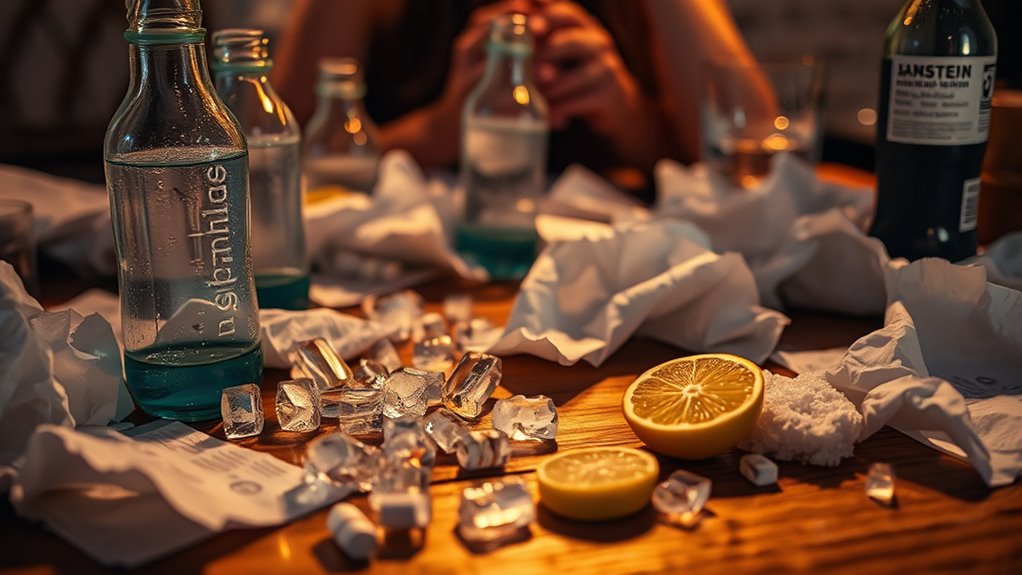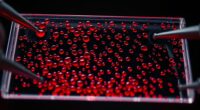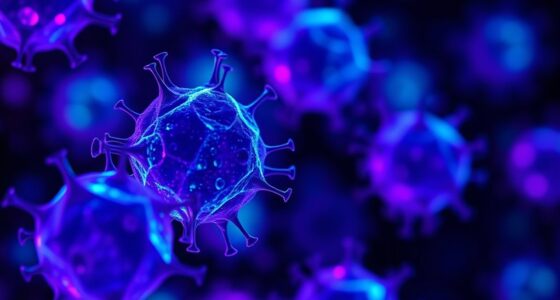When you drink alcohol, your body turns ethanol into acetaldehyde, a toxic compound that causes hangover symptoms. Your liver enzymes try to break down these toxins, but efficiency varies based on genetics, age, and health. To reduce hangovers, stay well-hydrated, replenish lost nutrients, and support your liver with nutritious foods or supplements. Understanding this chemistry can help you minimize effects—if you want to discover more ways to counteract hangovers, keep exploring.
Key Takeaways
- Alcohol metabolism produces toxic acetaldehyde, which contributes to hangover symptoms; faster clearance reduces severity.
- Genetic variations affect enzyme efficiency, influencing how quickly toxins are eliminated and how severe hangovers can be.
- Hydration supports toxin elimination and alleviates dehydration-related symptoms like headache and fatigue.
- Nutritional support with vitamins and antioxidants enhances liver function and neutralizes free radicals involved in hangover pathology.
- Moderating alcohol intake and supporting natural detox processes through hydration and nutrition are evidence-based strategies to mitigate hangovers.

Have you ever wondered what causes a hangover? It’s not just about feeling groggy or nauseous after a night of drinking; there’s a complex chemistry behind it. When you consume alcohol, your body begins a process called alcohol metabolism. Your liver takes center stage here, converting ethanol—the type of alcohol in drinks—into acetaldehyde, a toxic compound that’s even more harmful than ethanol itself.
Your body then works to eliminate this toxin efficiently; enzymes like alcohol dehydrogenase and aldehyde dehydrogenase play *vital* roles in breaking down these substances. If these enzymes can’t keep up, acetaldehyde accumulates, leading to symptoms like headache, nausea, and fatigue. This toxin buildup is a *key* part of what makes hangovers so unpleasant.
Enzymes like alcohol and aldehyde dehydrogenase break down toxins; when they lag, hangover symptoms worsen.
Toxin elimination is a race against time. Your body’s ability to clear these harmful byproducts depends on genetic factors, hydration levels, and overall health. When you drink heavily, your liver becomes overwhelmed, and the excess toxins linger longer in your system. This prolonged presence *intensifies* the symptoms you associate with hangovers.
Staying hydrated helps support toxin elimination, as alcohol is a diuretic, which causes dehydration—a *vital* contributor to headaches and fatigue. Consuming water alongside alcohol can aid your body’s natural detox process, helping to flush out toxins more efficiently. Additionally, consuming certain crochet techniques can aid in relaxation, which may indirectly support your body’s recovery process.
Moreover, the rate at which your body metabolizes alcohol influences how severe your hangover will be. If your liver processes alcohol slowly, toxins stay in your system longer, leading to more *pronounced* symptoms. On the other hand, some people metabolize alcohol faster due to genetic variations, experiencing milder hangovers.
Supporting your liver’s detox pathways with proper nutrition and lifestyle choices can greatly impact recovery. Additionally, liver enzyme efficiency varies among individuals and can be influenced by factors such as age, diet, and overall health, affecting how quickly toxins are cleared.
But regardless of your metabolism speed, the primary goal should be supporting your body’s natural detox pathways. This includes staying well-hydrated, eating nutrient-rich foods to replenish lost vitamins, and giving your liver time to catch up. Supplements like N-acetylcysteine and antioxidants can also bolster toxin elimination by neutralizing free radicals produced during alcohol breakdown.
Understanding the chemistry behind hangovers reveals that they’re more than just a consequence of drinking too much. They’re rooted in the body’s effort to process and eliminate toxins efficiently. By supporting this natural process—through hydration, proper nutrition, and moderation—you can reduce the severity of hangovers and help your body recover faster.
Frequently Asked Questions
Do Different Alcoholic Beverages Cause Different Hangover Symptoms?
Different alcoholic beverages can cause varied hangover symptoms because they influence alcohol absorption and contain different hangover triggers.
For example, drinks with higher congeners, like whiskey or red wine, may lead to more severe headaches and nausea. Clear spirits like vodka often cause milder symptoms.
Your body’s response depends on how the alcohol is absorbed and the specific compounds present, making some drinks more likely to trigger certain hangover symptoms than others.
Can Genetics Influence Hangover Severity?
You might worry genetics don’t matter, but your genetic predisposition can actually shape your hangover experience. Your genes influence alcohol metabolism, affecting how quickly your body processes drinks.
If you have a slower metabolism, you could face worse symptoms. Recognizing this helps you understand why some people suffer more intensely—your genes play a role in how your body handles alcohol.
Making genetics a key factor in hangover severity.
How Does Dehydration Specifically Affect Brain Function After Drinking?
Dehydration from alcohol metabolism causes electrolyte imbalance, which impacts your brain function. When you drink, alcohol triggers increased urination, leading to fluid loss.
This reduces blood volume, making it harder for nutrients and oxygen to reach your brain. The resulting electrolyte imbalance disrupts nerve signaling, causing symptoms like confusion, headache, and fatigue.
Staying hydrated helps maintain electrolyte levels, supporting brain function and easing hangover symptoms.
Are There Long-Term Health Effects From Repeated Hangovers?
Think of repeated hangovers as wear and tear on your body’s engine.
Long-term effects may include damage to your liver, brain, and heart, as alcohol disrupts metabolic pathways and can lower your alcohol tolerance over time.
This persistent strain increases risks for chronic diseases, mental health issues, and addiction.
If you keep ignoring these signals, you might find your health’s resilience fading, leaving you vulnerable to lasting harm.
What Role Do Congeners Play in Hangover Intensity?
Congeners, which are impurities in alcoholic beverages, markedly influence hangover severity. Higher congener concentration typically correlates with more intense hangovers.
When you compare beverages, those with more congeners, like dark liquors, tend to cause worse hangovers than clear spirits. So, choosing drinks with lower congener levels can help reduce hangover severity.
Be mindful of beverage comparison and opt for options with fewer congeners for a milder aftermath.
Conclusion
Understanding the chemistry behind hangovers reveals that dehydration and toxic byproducts play major roles. While drinking water and resting can help, some studies suggest antioxidants like vitamin C may mitigate symptoms by neutralizing free radicals. Notably, research hints that congeners—compounds in darker drinks—might worsen hangovers, supporting the idea that lighter spirits cause less misery. So, next time, choose your drinks wisely and hydrate well—science shows it could make your morning a whole lot better.









